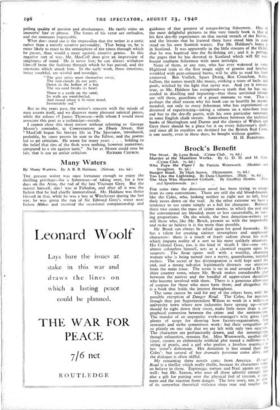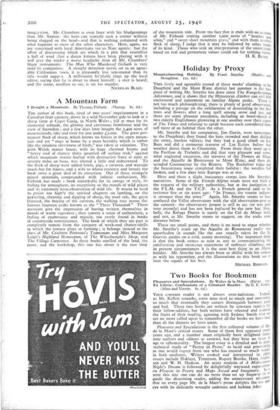Brock's Benefit
The Stoat. By Lynn Brock. (Crime Club. 7s. 641)
Murder at the Munition Works. By G. D. H. and M. Cole. (Crime Club. 7s. 6d.)
Danger Road. By Mark Saxton. (Heinemann. 7s. 6d.)
-
FOR some time the detection novel has been trying to escape from its own conventions. There are still the old blood-hounds, like the Coles, who, looking neither to right nor to left, keep their noses down on the trail. At the other extreme we have a tendency to use crime simply as a foil for character. Between these two comes the mass of crime stories, in which the real and the conventional are blended, more or less successfully, in vary- ing proportions. On the whole, the best detection-writers are still those who, like Mr. Brock, present us with the improbable and make us believe it is the more than possible.
Mr Brock can always be relied upon for good fireworks. He has a talent for creating sinister atmosphere and unpleasant
characters: there is a touch of frank sadism about his work which imparts reality of a sort to his most unlikely situations. His Colonel Gore, too, is the kind of sleuth I like—one who,
almost colourless himself, acts as a chemical reagent upon his suspects. The Stoat opens well with a wealthy, charming woman who is being turned into a nervy, quarrelsome, terrified recluse. The secret of her disintegration is well kept until the
end, and a strong sub-plot legitimately distracts our attention from the main issue. The scene is set in and around a Devon-
shire country town, where Mr. Brock makes considerable plaY between the natives and the handful of upper-crust decadents who become involved with them. There is a generous allowance of corpses for those who must have them; and altogether this is a book that holds the interest throughout. The same cannot be said for any of the others here, with the possible exception of Danger Road. The Coles, for instance, though they put Superintendent Wilson to work in a milieu-7a
university town where new industries have sprung up—which should be right down their street, make little more than a geo-
graphical connexion between the crime and the environment. The murder of an unpopular works-manager's wife gives them plenty of scope for showing how factory-organisation, shop
stewards and • strike committees work: but their sympathies are so plainly on one side that we are left with only two susreas. The characters are perfunctorily drawn, and the investigation,
though exhaustive, remains flat. Miss Wentworth, another old- timer, creates an elaborately artificial plot round a millionaire, a string of pearls, and a girl who prefers a loveless marriage to her sister's dishonour. Her detection is less sound than the Coles': but several of her dramatis personae come alive. and the dialogue is often skilful.
My remaining three novels come from America. 1, imagination. Mr. Chambers is even freer with his bludgeonings than Mr. Saxton : the hero can scarcely turn a corner without being slugged on the head—and that is nothing compared with what happens to most of the other characters. Here, again, we are concerned with loyal Americans ver us Nazi agents : but the effort of discovering which are which in a plot that resembles a ball of wool after a dozen kittens have been playing with it will give the reader a worse headache than all Mr. Chambers' blunt instruments. The Man Who Murdered Goliath is very mild by comparison A straight detection novel, set in an agree- able Californian 'own, it is pleasantly less sensational than its title would suggest. A millionaire helpfully rings up the local editor, saying that he is about to shoot himself : a shot is heard; and the scene, needless to say, is set for murder. NICHOLAS BLAKE.































 Previous page
Previous page